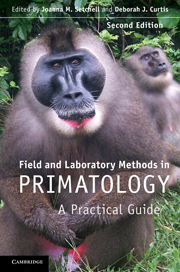Book contents
- Frontmatter
- Contents
- List of contributors
- Foreword by Robert D. Martin
- Introduction
- 1 An ethnoprimatological approach to interactions between human and non-human primates
- 2 Habituating primates: processes, techniques, variables and ethics
- 3 Habitat description and phenology
- 4 Geographical information systems and remote sensing
- 5 Monitoring local weather and climate
- 6 Survey and census methods: population distribution and density
- 7 Trapping primates
- 8 Handling, anaesthesia, health evaluation and biological sampling
- 9 Morphology, morphometrics and taxonomy
- 10 Marking and radio-tracking primates
- 11 Field experiments with non-human primates: a tutorial
- 12 Feeding ecology, frugivory and seed dispersal
- 13 Dietary analysis I: food physics
- 14 Dietary analysis II: food chemistry
- 15 Collecting arthropods and arthropod remains for primate studies
- 16 Recording primate vocalizations
- 17 Photography and video for field researchers
- 18 Chronobiological aspects of primate research
- 19 Thermoregulation and energetics
- 20 Field endocrinology: monitoring hormonal changes in free-ranging primates
- 21 Collection, storage and analysis of non-invasive genetic material in primate biology
- 22 Tips from the bush: an A–Z of suggestions for successful fieldwork
- Index
- References
4 - Geographical information systems and remote sensing
Published online by Cambridge University Press: 05 June 2012
- Frontmatter
- Contents
- List of contributors
- Foreword by Robert D. Martin
- Introduction
- 1 An ethnoprimatological approach to interactions between human and non-human primates
- 2 Habituating primates: processes, techniques, variables and ethics
- 3 Habitat description and phenology
- 4 Geographical information systems and remote sensing
- 5 Monitoring local weather and climate
- 6 Survey and census methods: population distribution and density
- 7 Trapping primates
- 8 Handling, anaesthesia, health evaluation and biological sampling
- 9 Morphology, morphometrics and taxonomy
- 10 Marking and radio-tracking primates
- 11 Field experiments with non-human primates: a tutorial
- 12 Feeding ecology, frugivory and seed dispersal
- 13 Dietary analysis I: food physics
- 14 Dietary analysis II: food chemistry
- 15 Collecting arthropods and arthropod remains for primate studies
- 16 Recording primate vocalizations
- 17 Photography and video for field researchers
- 18 Chronobiological aspects of primate research
- 19 Thermoregulation and energetics
- 20 Field endocrinology: monitoring hormonal changes in free-ranging primates
- 21 Collection, storage and analysis of non-invasive genetic material in primate biology
- 22 Tips from the bush: an A–Z of suggestions for successful fieldwork
- Index
- References
Summary
INTRODUCTION
A Geographic Information System (GIS) is a collection of hardware and software for the storage, retrieval, mapping and analysis of geographic data (Table 4.1). The spatial data held in a GIS refer to a particular place on earth, represented in a coordinate system such as latitude and longitude (i.e. the data are geo-referenced). GIS data are of two general types: vector, with points, lines (arcs) and polygons as fundamental components; and raster, where the data are held as a grid of pixels. One of the most common sources of raster data for a GIS is satellite remote sensing. We may define remote sensing in a variety of ways but it refers to the process of acquiring information about the Earth's surface without being in contact with it (e.g. from aircraft or satellites). Remote sensing involves recording reflected or emitted radiation and processing, analysing and applying the output to a particular problem.
In this chapter we consider how GIS and remote sensing may be applied to problems in primatology, a topic that appears to have a relatively small body of literature, although the fields of GIS and remote sensing are themselves vast. Where possible, we cite examples from the primate literature to illustrate the range of applications where GIS is invaluable but also draw on wider examples where primate work could benefit from techniques that are employed on other groups of animals.
Information
- Type
- Chapter
- Information
- Field and Laboratory Methods in PrimatologyA Practical Guide, pp. 69 - 90Publisher: Cambridge University PressPrint publication year: 2011
References
Accessibility standard: Unknown
Why this information is here
This section outlines the accessibility features of this content - including support for screen readers, full keyboard navigation and high-contrast display options. This may not be relevant for you.Accessibility Information
- 2
- Cited by
